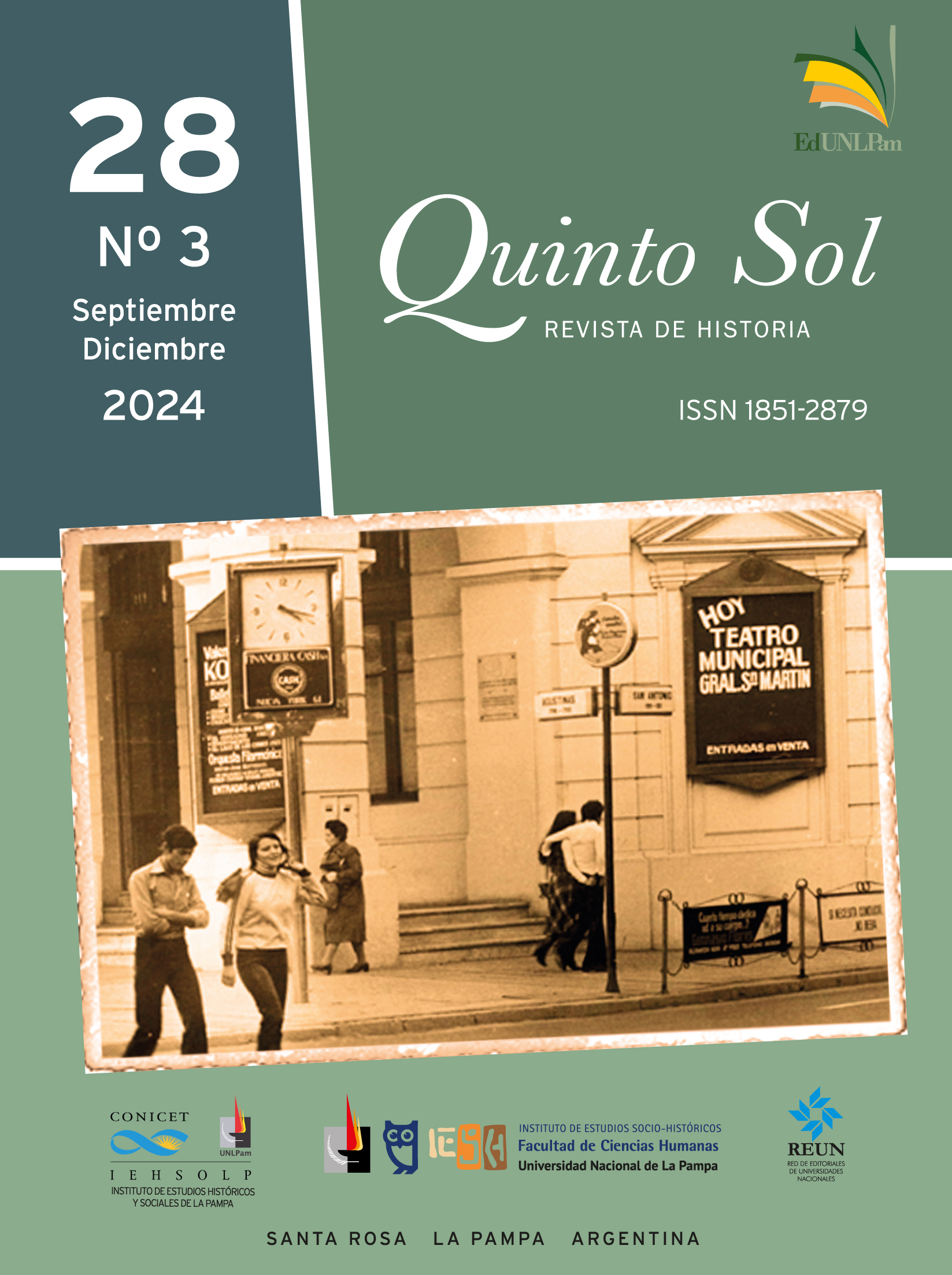Introdução ao Dossiê: “Cultura, comunicação e construção de consensos. Estratégias de legitimação da última ditadura civil-militar argentina (1976-1983)”
Palavras-chave:
ditadura, propaganda, estratégias de comunicaçãoResumo
Este dossiê constitui uma amostra de pesquisas realizadas há vários anos sobre o problema do consenso social que surgiu sob regimes estatais ditatoriais. Nesta publicação, os artigos compilados centram-se na análise dos consensos relacionados com a última ditadura militar na Argentina (1976-1983) com o objetivo de investigar os processos de geração, identificando as estratégias específicas e a sua persistência ou a sua mudança ao longo do tempo. tempo. Especificamente, questionam-se sobre a forma como, através da comunicação e da cultura, o autoproclamado “Processo de Reorganização Nacional” tentou provocar a adesão da população ao seu projecto político.Downloads
Referências
Águila, G. (2008). Dictadura, represión y sociedad en Rosario, 1976-1983: un estudio sobre la represión y los comportamientos y actitudes sociales en dictadura. Prometeo Libros.
Alonso, L. (2022). “Qué digan dónde están”. Una historia de los derechos humanos en Argentina. Prometeo Libros.
Brocato, C. (1986) El exilio es el nuestro. Los mitos y los héroes argentinos. ¿Una sociedad que no se sincera? Sudamericana-Planeta.
Buch, E. (2016). Música, dictadura, resistencia. La Orquesta de París en Buenos Aires. Fondo de Cultura Económica.
Carassai, S. (2013). Los años setenta de la gente común. La naturalización de la violencia. Siglo XXI.
Crenzel, E. (2008). La historia política del nunca más. La memoria de las desapariciones en la Argentina. Siglo XXI.
Duhalde, E. L. (1983). El Estado terrorista argentino. Argos Vergara, Ediciones El Caballito S.R.L.
Franco, M. (2016). La noción de “dictadura cívico-militar”. En P. Flier (Coord.) Mesas de debate de las VII Jornadas de Trabajo sobre Historia Reciente, (pp. 69-90). Facultad de Humanidades y Ciencias de la Educación Universidad Nacional de La Plata.
Jelin, E. (2002). Los trabajos de la memoria. Siglo XXI de España Editores.
Lvovich, D. (2008). Actitudes sociales y dictaduras: las historiografías española y argentina en perspectiva comparada. Páginas, 1(1), 29-49.
Novaro, M. y Palermo, V. (2003). La dictadura militar. 1976/1983. Del golpe de Estado a la restauración democrática. Paidós.
O´Donnell, G. (1984). Democracia en la Argentina. Micro y macro. En: O. Oszlak (Comp.) “Proceso”, crisis y transición democrática/1 (pp. 13-30). Centro Editor de América Latina.
Pucciarelli, A. R (Coord.) (2004). Empresarios, tecnócratas y militares. La trama corporativa de la última dictadura. Siglo XXI.
Quiroga, H. (1994). El tiempo del ‘Proceso’. Conflictos y coincidencias entre políticos y militares 1976-1983. Homo Sapiens-Fundación Ross.
Risler, J. (2018). La acción psicológica. Dictadura, Inteligencia y gobierno de las emociones (1955-1981). Tinta Limón.
Schenquer, L. (Comp.) (2023). Terror y consenso: políticas culturales y comunicacionales de la última dictadura. Editorial de la Universidad Nacional de La Plata.
Yannuzzi, M. A. (1996). Política y dictadura: los partidos políticos y el "proceso de reorganización nacional". 1976-1982. Editorial Fundación Ross.
Downloads
Publicado
Edição
Seção
Licença
Copyright (c) 2024 Quinto Sol

Este trabalho está licenciado sob uma licença Creative Commons Attribution-NonCommercial-ShareAlike 4.0 International License.
Al momento de enviar sus contribuciones, los colaboradores deberán declarar que poseen el permiso del archivo o repositorio donde se obtuvieron los documentos que se anexan al trabajo, cualquiera sea su formato (manuscritos inéditos, imágenes, archivos audiovisuales, etc.), permiso que los autoriza a publicarlos y reproducirlos, liberando a la revista y sus editores de toda responsabilidad o reclamo de terceros.
Asimismo, los autores deben adherir a la licencia Creative Commons denominada “Atribución - No Comercial CC BY-NC-SA”, mediante la cual el autor permite copiar, reproducir, distribuir, comunicar públicamente la obra y generar obras derivadas, siempre y cuando se cite y reconozca al autor original. No se permite, sin embargo, utilizar la obra con fines comerciales. Los autores podrán establecer acuerdos adicionales para la distribución no exclusiva de la versión de la obra publicada en la revista (por ejemplo, situarlo en un repositorio institucional o publicarlo en un libro), con el reconocimiento de haber sido publicado primero en esta revista.
La publicación de contenidos en esta revista no implica regalía ni cargo alguno para los/as contribuyentes.
Quinto Sol adhiere adhiere a DORA (Declaration on Research Assessment) firmada en San Francisco, California, el 16 de diciembre de 2012, y a la Declaración de México (Declaración Conjunta LATINDEX - REDALYC - CLACSO - IBICT).






4.png)
2.png)












_(2).png)


2.jpg)



1.jpg)





